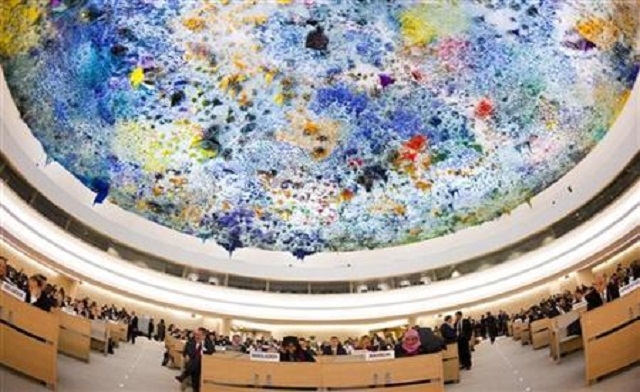
Les Etats-Unis, l’Allemagne et l’Irlande ont été élus lundi au Conseil des Droits de l’Homme de l’ONU au terme d’un scrutin âprement disputé. Les Etats-Unis, l’Allemagne et l’Irlande ont été élus à la majorité par les 193 Etats membres de l’Assemblée générale des Nations unies, tandis que 15 autres pays dont le Venezuela, le Pakistan et l’Ethiopie remportaient également un siège, selon un découpage régional.
Le Figaro
Ce conseil, créé en 2006 est composé de 47 États élus pour 3 ans. Dans la liste des nouveaux admis nous ne voyons pas le nom du Viet Nam. La candidature de cet État est donc rejetée.Et ce n’est que de la justice! Vietnam cherche à y entrer pour camoufler sa politique d’oppression contre le peuple vietnamien depuis plusieurs décennies. Cette candidature a rencontré une opposition farouche de tous les vietnamiens de l’intérieur comme de la diaspora éparpillée de par le monde entier après l’invasion de l’Armée du Viet Nam communiste du Nord le 30 avril 1975 au sud du territoire qui était sous un régime républicain avec une certaine démocratie naissante! Dans tous les domaines le Viet Nam n’ a rempli aucune condition pour prétendre au titre de membre du Conseil des Droits de l’Homme! L’ONG Reporters sans Frontière a établi un palmarès de 2011 des États concernant la liberté, le Viet Nam se trouve dans le peloton des dix derniers États! C’est peu dire. Comment peut prétendre d’être un pays des Droits de l’Homme tout en emprisonnant des centaines d’opposants sans distinction: femmes; hommes; ecclésiastiques, paysans, citadins, intellectuels et surtout les blogueurs pour seul crime d’avoir réclamé la LIBERTÉ! Le gouvernement vise particulièrement ces derniers car il voit que l’internet est une arme redoutable contre les violations des droits du citoyen. Que cet échec (l’entrée au Conseil!) serve de leçon à ce régime totalitaire!

U.S. wins re-election to U.N. Human Rights Council
UNITED NATIONS (Reuters) – The United States succeeded on Monday in its bid for re-election to the 47-nation U.N. Human Rights Council, a Geneva-based watchdog that has been criticized by Washington and Israel for singling out the Jewish state for criticism.
The 193-nation U.N. General Assembly also elected 17 other countries for terms beginning in January. The United States won the most votes of the regional group “Western Europe and Others,” followed by Germany and Ireland.
U.S. Ambassador to the United Nations Susan Rice welcomed Washington’s re-election, saying that the Human Rights Council “has delivered real results” since the United States first joined it in 2010 after running for a seat on it in 2009. She cited council action on Syria as a positive example of its work.
However, she criticized the rights council’s “excessive and unbalanced focus on Israel.”
Secretary of State Hillary Clinton echoed Rice’s comments.
“We pledge to continue to work closely with the international community to address urgent and serious human rights concerns worldwide and to strengthen the (rights) council,” Clinton said in a statement.
The United States had boycotted the Human Rights Council until 2009, when the administration of President Barack Obama reversed U.S. policy and ran for a seat on the body in an effort to reform it from within.
Greece and Sweden failed to secure spots on the council in the “Western Europe and Others” category, the only regional group that had a competitive slate. Other regional groups had uncompetitive slates that assured victory for those in the running as there were enough seats for all candidates.
Ivory Coast, Ethiopia, Gabon, Kenya, and Sierra Leone were elected from Africa, and Japan, Kazakhstan, Pakistan, South Korea, and the United Arab Emirates from the Asia Group.
Estonia and Monte negro were elected from Eastern Europe, while Argentina, Brazil, and Venezuela secured seats on behalf of the Latin America and Caribbean Group.
DUBIOUS RIGHTS RECORDS
New York-based Human Rights Watch criticized the vote, saying it fell far short of a bona fide election.
“To call the vote in the General Assembly an ‘election’ gives this process way too much credit,” said Peggy Hicks of Human Rights Watch. “Until there is real competition for seats in the Human Rights Council, its membership standards will remain more rhetoric than reality.”
Votes for seats on U.N. bodies, including the Security Council, often have uncontested regional slates.
Freedom House, a Washington-based rights watchdog, said that seven of the countries that secured seats on the council ”Ivory Coast, Ethiopia, Gabon, Kazakhstan, Pakistan, UAE, and Venezuela” are unqualified for membership on a body that requires members to uphold the highest standards regarding human rights.
Freedom House said that the qualifications of three other new members – Brazil, Kenya, and Sierra Leone – were questionable.
Earlier this year, Sudan had announced plans to run for a seat on the Human Rights Council but withdrew after it was criticized by rights groups. Khartoum instead secured a seat on the U.N. Economic and Social Council, one of the world body’s principal organs, which coordinates economic and social issues.
Syria had attempted to run for a seat on the rights council last year but withdrew due to pressure from Western and Arab states. Syrian President Basher al-Assad’s government, which has led a 20-month military campaign against an increasingly militarized opposition, plans to run for a rights council seat next year.
Rights advocates have successfully mounted similar campaigns against previous candidates for the Human Rights Council, including Belarus, Sri Lanka, Azerbaijan and Iran.
Louis Charbonneau, Reuters
November 12, 2012
(Reporting By Louis Charbonneau; Editing by Doina Chiacu)











































